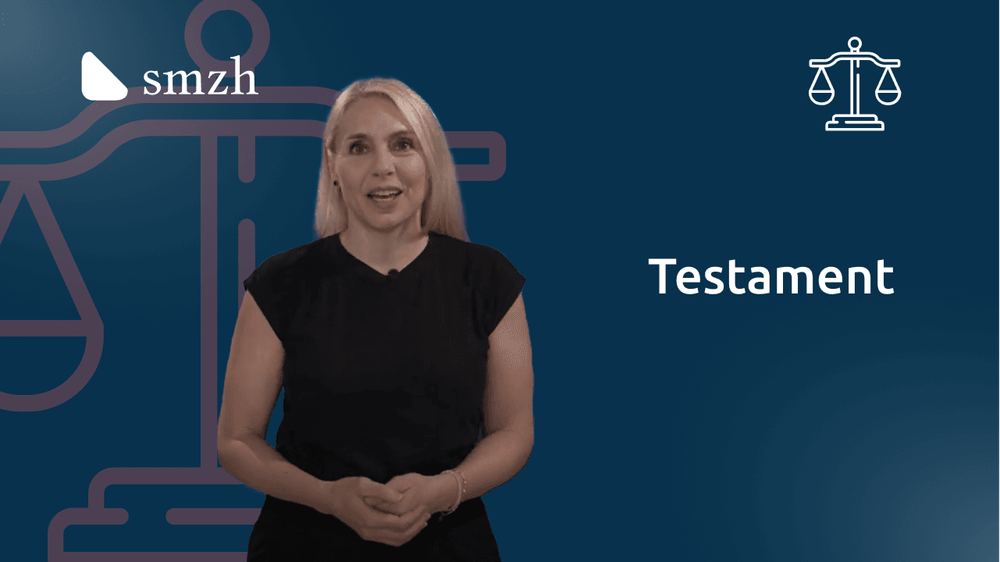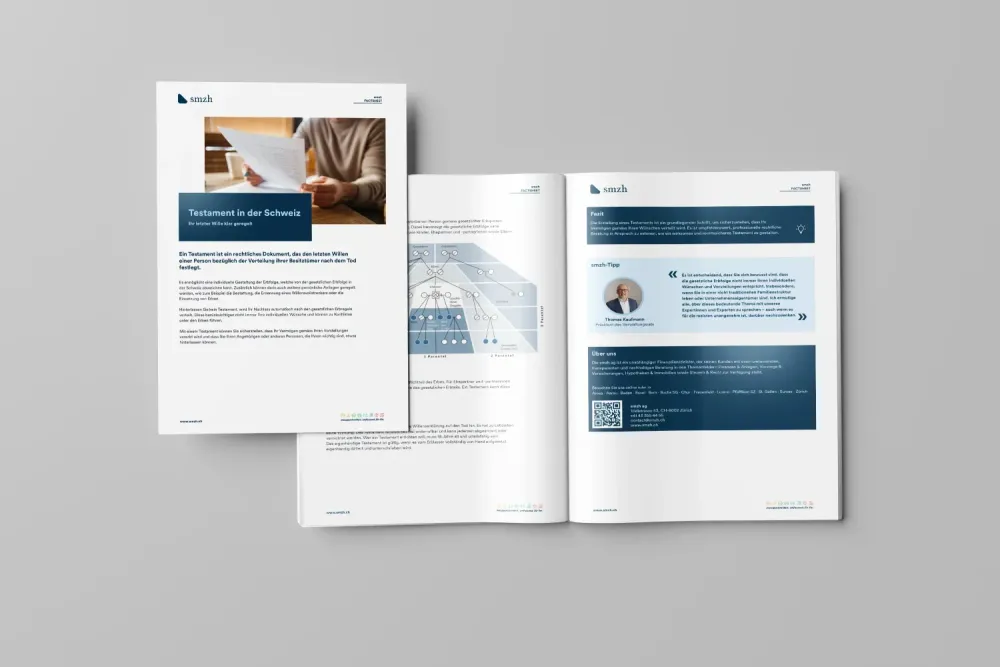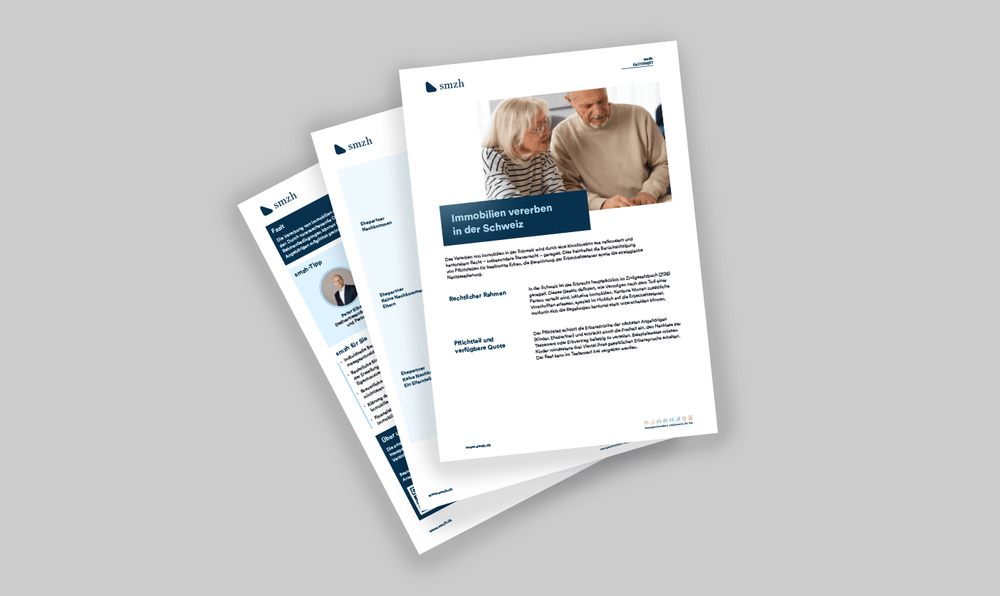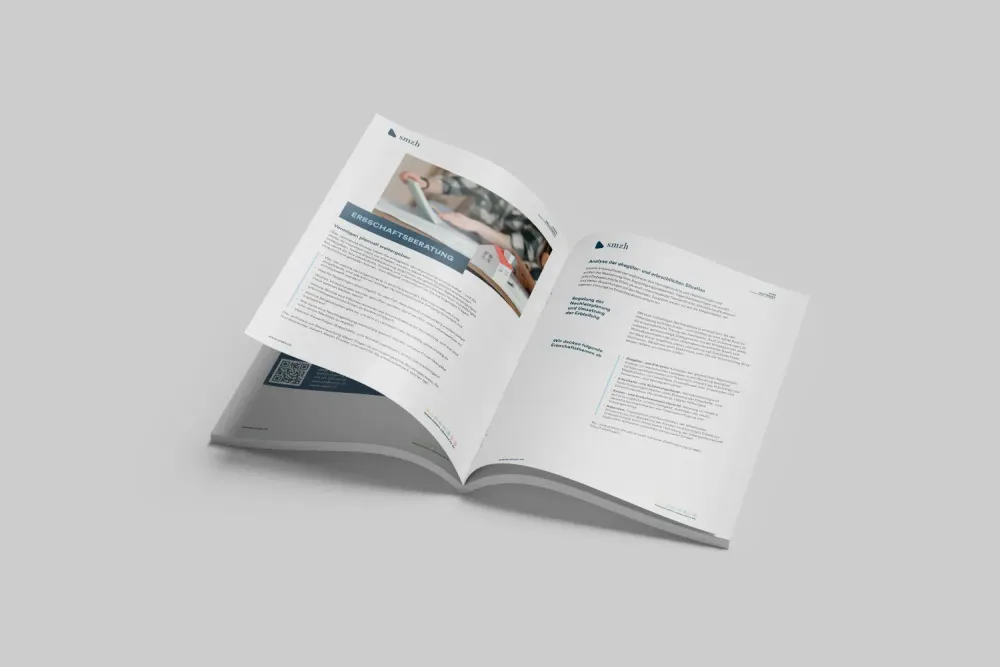Did you know that over 60% of the Swiss population have not made any legally binding arrangements for their estate?
This alarming number demonstrates how many people leave their future – and that of their loved ones – to chance. In our daily work, we see that forward-looking estate planning is not only important for older individuals. Any of us could suddenly find ourselves in a situation, due to accident or illness, where clear arrangements become essential.
The consequences of failing to plan ahead can be far-reaching: from one's will and inheritance contracts to possible decisions by the Child and Adult Protection Authority (KESB) regarding advance directives or powers of attorney – without clear instructions, others may decide what happens to your wealth or personal assets. Sound estate planning is indispensable, particularly in more complex or international family situations.
We show you step by step how to best structure your estate – from drawing up a legally binding will to other key aspects of asset and inheritance planning. This way, you ensure that your wishes and intentions are clearly recorded and respected in case of emergency.

The most important provision tools at a glance
In Switzerland, various provision documents form the basis of comprehensive estate planning. We show you the most important ones and explain their significance.
Today, early and careful estate planning is more important than ever. A representative survey of Swiss citizens eligible to vote shows that almost 50% erroneously believe that de-facto domestic partners are legal heirs. This false belief can have serious consequences.
The following steps are essential in successful and effective estate planning:
Following the revision of Swiss inheritance law in 2023, we now enjoy greater flexibility in structuring our estate. The compulsory portion for descendants has been reduced, while the compulsory portions for parents have been completely abolished. These changes make it possible to better reflect modern family constellations and personal wishes.
In modern estate planning, transferring assets in lifetime is gaining importance. In 2022, an estimated CHF 88 billion were passed down or gifted in Switzerland.
Based on our vast experience as advisors, we understand that making gifts in lifetime offers various important benefits:
Despite these benefits, there are certain risks that must be kept in mind. A gift is irrevocable, hence it should not put ourselves into a precarious financial situation. What's particularly important to know is that, if ever we rely on supplementary benefits later on, previous gifts will be included in the calculation.
The fiscal consequences of gifts differ considerably by canton. Most cantons to not tax gifts to spouses and direct descendants. Depending on the degree of kinship and amount gifted, other recipients are subject to varying tax rates.
Key tax considerations:
One particularly interesting option is a transfer including beneficial use or right of residence. Beneficial use allows us to retain full use of a property despite transferring it.
Beneficial use includes:
Compared to beneficial use, the right of residence is more restrictive, only allowing personal use of a property. We recommend carefully considering the advantages and disadvantages of both options.
In the case of transfer including beneficial use, the taxable value of a gift is reduced by the capitalized value of the beneficial use. This can prove fiscally beneficial particularly when transferring real estate.
Legal protection is of particular importance in this context: Beneficial use and right of residence must both be recorded in the land register. We strongly recommend having a notary certify the transfer in order to avoid later disputes.

When choosing between a notary or a lawyer, it is important to keep in mind their different competencies. Notaries are in charge of official certifications and provide impartial advice. We recommend seeking professional support especially in the following cases:
The executor plays a pivotal role in implementing our last will. His or her main tasks are:
Particulary important: The executor must inform the heirs regularly and without prior solicitation. In the event of a longer execution, an update must be provided at least annually.
A regular review of the provision documents is key to successful estate planning. The revision of Swiss inheritance law in 2023 reduced the compulsory portions of descendants from three quarters to half, making it particularly important to update existing documents.

Learn about the key aspects of a will that establishes your wishes during lifetime, ensuring that no decisions are left to a legal guardian after your passing and that potential conflicts among heirs are prevented.
(in German)

An own home is more than just a property – it is a place full of memories. But what happens to the property in the event of inheritance? This video explains the options available to you – from gifting and advancement of inheritance to selling – and highlights what you should consider to avoid family conflicts and to ensure optimal tax planning.
(in German)

Secure the future of your company with early and well-considered succession planning. In this video, we show you the seven steps that are especially important for successful corporate succession.
(in German)

A will enables you to clearly set out your last wishes – deviating from the statutory order of succession and tailored to your personal circumstances.

Passing down real estate in Switzerland must be planned carefully. Learn which legal requirements, compulsory portions, and cantonal differences must be considered, and how to best organize your estate.

Our inheritance advisory service helps you address complex family, legal, and tax matters proactively – tailored to your needs, clearly explained, and always taking your personal circumstances into consideration.
Certain life events should always prompt us to review our advance directives and estate documents. A recent study shows that only 30% of Swiss residents over the age of 45 regularly update their will. The following events require special attention:
Important to note: As of 1 January 2023, the compulsory portion for parents was completely abolished. This provides new opportunities to benefit domestic partners or other close individuals.
Careful documentation of our retirement and estate planning is essential. According to a study, nearly half of all inheritance disputes are due to unclear or lack of documentation.
Your benefits when planning your estate with smzh:

Plan your estate proactively and legally sound – with smzh by your side.

We handle questions just like these on a daily basis. You don't need to deal with complex topics regarding estate planning by yourself – we are by your side with experience, clarity, and foresight.
Without a will, the statutory order of succession applies – and in serious cases, authorities or court-appointed individuals may make decisions on your behalf. Your personal wishes are then often not taken into account. With proactive planning, you ensure that your values and preferences are respected.
Well-thought-out estate planning must include: will or inheritance contract, advance care directive, living will, overview of one's digital estate, current powers of attorney and documentation on key data.
At the latest, you should review your advance directives and estate documents when major events such as marriage, divorce, childbirth, the purchase of real estate, or changes in the law occur – ideally, however, once a year using a checklist.
We offer you personal, legally sound, and clear guidance – from the initial assessment to the implementation of all relevant advance directives, individually tailored to your personal situation.